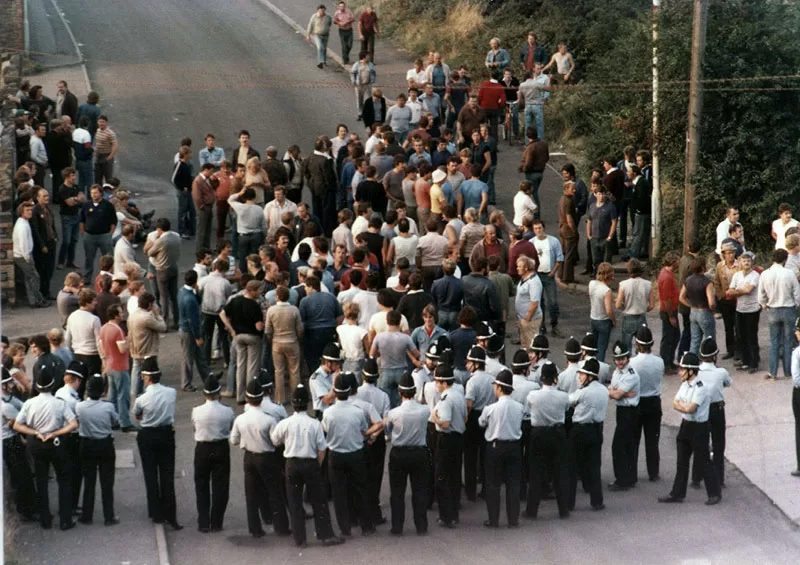For those of us in the British Labour movement this month has been a period of reflection – on the pain, anger and pride associated with an industrial action which became intrinsically linked with people’s sense of place, community and politics in the post war period.
In the heart of South Yorkshire, at the Cortonwood colliery, a new page of history was written. On 6 March 1984, the first sparks of the miners’ strike were ignited when miners at the colliery, which had been established in 1873, withdrew their labour in protest at plans announced by the National Coal Board to close the pit.
For British miners and their trade union, the NUM, this was the first act of a plan to start systematically closing UK coal mines. The closures were a direct threat to people’s livelihoods and the very essence of their communities.
This isn’t just a pivotal moment in British industrial history but was also a defining moment for the development of my social value system. My grandfather was a striking miner at the Bilston Glen pit in Scotland and one of my earliest memories is collecting food in the East End of London to send to striking miners.
Forty years on from the miners’ strike it’s important that we remember not just the damage done to people and families, but how powerful interests can combine to subjugate and silence those standing up for their rights.
While some may not immediately recognise industrial action as a form of freedom of expression, I would argue that withdrawal of labour is the ultimate expression of your freedom. At its core, industrial action embodies the collective voice of workers asserting their rights and advocating for their economic interests. Whether through strikes, protests, or other forms of organised resistance, workers exercise their agency to challenge unjust conditions, demand fair treatment, and negotiate for better terms of employment. This expression is not merely confined to vocal dissent but extends to the very actions that disrupt the status quo, thereby amplifying the voice of the marginalised and empowering individuals to challenge entrenched power structures. In this light, industrial action emerges as a potent manifestation of freedom of expression, serving as a vital instrument for social change and democratic participation in shaping the contours of labour relations.
All that was put at risk in 1984 when senior government ministers and certain sections of the media conspired to paint those taking industrial action as “the enemy within”. A view perpetuated by the Prime Minister of the time, Margaret Thatcher. Handwritten notes from the Margaret Thatcher archives show her thinking:
“Since Office. Enemy without – beaten [Galtieri] & resolute strong in defence. Enemy within – Miners’ leaders… Liverpool and some local authorities – just as dangerous… in a way more difficult to fight… just as dangerous to liberty.”
The damaging effects of this rhetoric can still be seen and felt today.
The miners’ strike lasted for 11 months, 3 weeks and 4 days. 11,291 miners and allies were arrested on pickets and at demos. Communities were devastated, families went hungry and proud men lost their livelihoods forever.
There are many chapters in the story of the Miners’ strike, but the one where there are still more questions than answers is the Battle of Orgreave. The events at Orgreave on 18 June 1984 mark the lowest and most violent point in British industrial relations, where the principle of policing by consent nearly collapsed and the police were arguably used as a tool by the state to squash dissent. The media adopted a one-dimensional narrative on events which framed the striking miners and picketers as the aggressors and the police as the innocents. This portrayal is increasingly being challenged as a more comprehensive narrative emerges, prompting critical reflection on the broader implications of industrial disputes and the state response.
For me the miners’ strike of 1984 stands as a poignant reminder of the enduring struggle for freedom of expression and the pivotal role it plays in safeguarding democratic values. By reflecting on the strike and the power imbalance typically deployed, we must remember the sacrifices made by those who fought tirelessly for their rights in the face of formidable opposition. It serves as a sobering lesson on the dangers posed by governments and vested interests seeking to undermine this fundamental freedom.
As custodians of democracy, we are duty-bound to uphold and defend the right to express dissent, knowing that its suppression can lead to the erosion of civil liberties and the consolidation of power in the hands of the few. Thus, the miners’ strike of 1984 stands not only as a testament to past struggles but also as a call to vigilance in protecting the freedoms that form the bedrock of our society.






